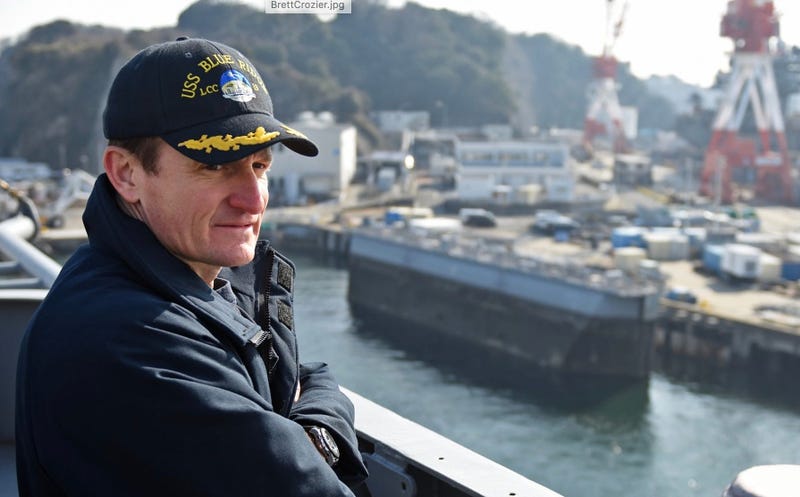
Capt. Brett Crozier of the USS Theodore Roosevelt wrote a internal letter to the Navy explaining that he felt his sailors were not being adequately protected from the COVID-19 outbreak on his ship. When the letter leaked to the press, it made national headlines so when Secretary of Defense Mark Esper said two days later that he had not had the chance to read it, the subtext was clear enough.
Esper had read it, was furious, and would relieve Crozier immediately. On the night of April 2, as Crozier walked down the gangplank of the aircraft carrier he had captained, his sailors hooted and cheered for him to show their support. Of course, video of the event surfaced on social media not long after.
But it is not just our government that condemned Crozier's career; increasingly the question for the American public is not if they support the troops or not, but which troops do they support? You see, which troops you choose to support really depends on which partisan political identity aligns with a particular troop. We've seen a number of these characters in recent history. Eddie Gallagher. Mathew Golsteyn. Alexander Vindman. And now, Brett Crozier.
In poll after poll, the military is America's most respected institution, and rightly so. Our service members work hard, place themselves at considerable risk, and do so for a citizenry completely unconcerned with the ethical and moral implications involved in deploying troops to war forever without any strategic end game in mind.
Meanwhile, the troops are increasingly being drawn into America's polarization as political actors attempt to co-opt the military for social and political currency. It is like hijacking religion, jump onto something that is well respected in society and distort its doctrine to serve your own purposes. The military has always been a political punching bag to be sure. Presidents exploit their military whether it is wearing a bomber jacket on the deck of an aircraft carrier after they ordered Iraq destroyed, having Hollywood make a silly movie about the Bin Laden raid, or tweeting out support for convicted or alleged war criminals. This is now normalized behavior.
What has changed, in my opinion, is that there is a schism in military culture, and it is increasingly observable by the American public. Whether it is Special Forces soldiers running Instagram accounts that mock their chain of command or videos on Twitter of sailors openly supporting their relieved commander over the whims of the Pentagon, it becomes clear to service members and civilians alike that there is a disconnect between the troops and much of their leadership.
What is worse, as service members have their service co-opted by political entrepreneurs in Washington, D.C. there is a tacit message being communicated to soldiers, sailors, marines and airmen. Do you want to be led by an Eddie Gallagher or a Brett Crozier? Maybe the answer is none of the above, but soldiers in combat get assigned leaders, it isn't a multiple choice type of question.
In my opinion, I do not think that our culture has grappled with what this means as of yet. I'm reminded of a story I worked on a few years ago about UN peacekeepers in the Golan Heights. Ostensibly, their job was to keep the peace between Israel and Syria in this disputed territory but in 2014 they were also experiencing spillover from the Syrian civil war.
That August, al-Nusra terrorists came across the border and captured a detachment of Fijian peacekeepers. With their hostages in tow, the terrorists next approached a position occupied by Filipino troops. Nusra told the Filipinos that if they surrendered their weapons to them that both they and the Fijians would be allowed to leave unharmed.
The peacekeepers reported the situation to the UN commander, Gen. Iqbal Singh Singha of India. They were shocked by the response they received. Singha ordered them to comply with Nusra and lay down their arms.
“I can tell you that this general does not listen to anyone on his staff,” Gen. Lito Sobejana told me in an interview. “I was his chief of staff and he does not listen at all. He is always correct. More often he wanted to decide on his own without consultation.”
The Filipino troops interpreted Singha's order as being incompetent as well as illegal and began communicating with their own military officers back in Manila. Think about this for a moment: these soldiers decided who they wanted to take orders from.
Today, the cultural gap between the Pentagon brass and the troops on the ground is more like a chasm and it is more obvious now than ever before. There are leaders who look out for their soldiers and there are others who would kill the men and women under their command in pursuit of a bird or a star on their uniform. We're twenty years into this war and we can no longer afford not to call it out for what it is.
Facing both partisan politicization on one end and corporate careerism on the other, how long will it be before the troops start going off book and deciding for themselves what is best for our military, and our country?
If we put politics above victory and the well being of the troops themselves, then can we blame them if they do?
